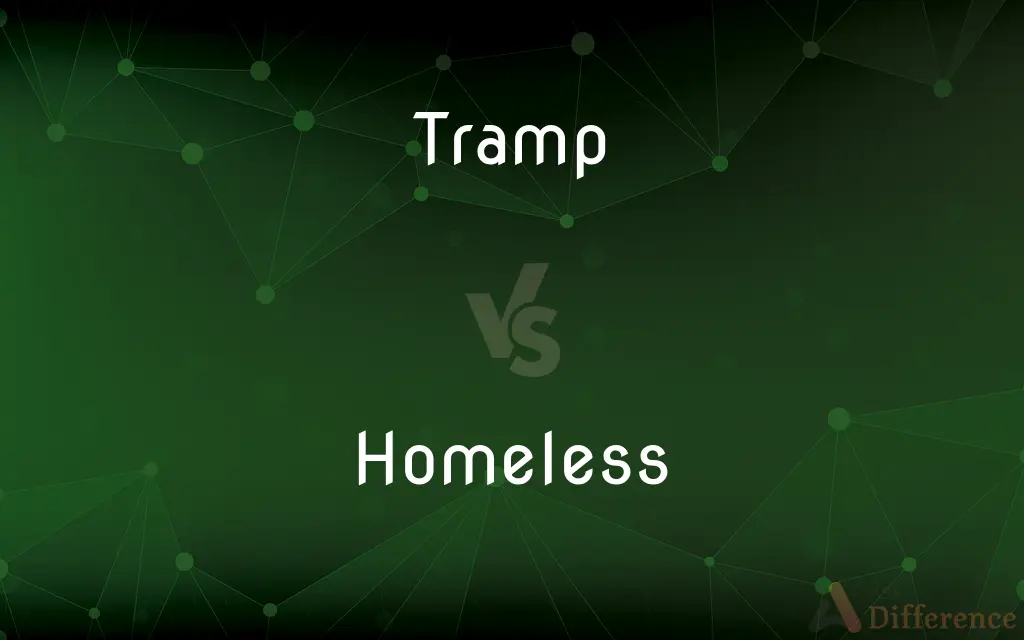Tramp vs. Homeless — What's the Difference?
Edited by Tayyaba Rehman — By Urooj Arif — Updated on March 15, 2024
Tramp refers to someone who travels from place to place often on foot, living by begging or working odd jobs, while homeless describes a person lacking a fixed, regular, and adequate nighttime residence.

Difference Between Tramp and Homeless
Table of Contents
ADVERTISEMENT
Key Differences
A tramp is characterized by their nomadic lifestyle, choosing to travel and live in a transient manner, often for reasons of personal choice or circumstance. They may work temporary jobs or rely on charity but are distinct in their movement from one location to another. Whereas a homeless person is defined by the lack of stable, permanent housing, which may result from a variety of factors including economic hardship, personal issues, or social conditions.
The concept of a tramp often carries with it a sense of voluntary movement and lifestyle. Tramps may choose to live outside societal norms, finding freedom in their transient way of life. On the other hand, homelessness is typically involuntary, with individuals and families finding themselves without a home due to uncontrollable circumstances, such as financial problems, natural disasters, or systemic failures.
Tramps historically have been part of a broader social fabric, with their lifestyle sometimes romanticized as a choice of freedom from societal constraints. In contrast, homelessness is viewed through a lens of social issue that reflects on the economic and structural adequacies of a society. The perception and societal response to each can vary significantly, reflecting broader attitudes towards poverty, freedom, and social responsibility.
While tramps may engage in itinerant work or live off the generosity of others, their identity is tied to their autonomy and mobility. Homeless individuals, however, often seek stability and security, striving for a return to a permanent and safe living situation. This fundamental difference in objectives highlights the divergent paths that lead to or away from societal norms and expectations.
In essence, the distinction between a tramp and a homeless person is not just in their current living situation but also in their approach to life and society. The term "tramp" suggests a degree of choice and a nomadic lifestyle, while "homeless" emphasizes the lack of a stable residence, often highlighting a broader societal issue that requires attention and support.
ADVERTISEMENT
Comparison Chart
Definition
A person who travels place to place, often living by begging or temporary jobs.
A person lacking a fixed, regular, and adequate nighttime residence.
Lifestyle
Nomadic and transient, often by choice.
Involuntary lack of housing, seeking stability.
Perception
Sometimes romanticized as freedom from societal constraints.
Viewed as a societal issue reflecting economic and structural problems.
Main Objective
Autonomy and mobility.
Stability and security in housing.
Societal Response
Varied, often with an emphasis on personal choice and freedom.
Focus on social support, economic aid, and housing solutions.
Compare with Definitions
Tramp
A person who travels from place to place without a permanent home.
He lived as a tramp, wandering through towns and working odd jobs.
Homeless
Often a result of economic hardship or social issues.
After losing her job, she became homeless, struggling to find stable housing.
Tramp
Someone living on the fringes of society by choice.
As a tramp, he preferred the solitude and simplicity of life on the move.
Homeless
A person without a permanent residence.
The homeless man found shelter in a community center during the winter.
Tramp
Associated with the act of tramping or wandering.
They set off on a tramp across the country, with no particular destination in mind.
Homeless
Someone seeking stability and a return to a secure living situation.
The homeless family received aid to secure a temporary home.
Tramp
Often characterized by a lifestyle choice of freedom and transient living.
She embraced the life of a tramp, seeking adventures on the road.
Homeless
Lacking a fixed, regular, and adequate nighttime residence.
Homeless individuals often rely on shelters for a place to sleep.
Tramp
A nomadic individual who may work temporary jobs.
The tramp worked seasonal jobs to fund his travels.
Homeless
Reflects a societal issue requiring attention and support.
The city launched programs to address the growing homeless population.
Tramp
A tramp is a long-term homeless person who travels from place to place as a vagrant, traditionally walking all year round.
Homeless
(of a person) without a home, and therefore typically living on the streets
Charities for the homeless
The plight of young homeless people
Tramp
Walk heavily or noisily
He tramped about the room
Homeless
Having no home or haven.
Tramp
A person who travels from place to place on foot in search of work or as a vagrant or beggar.
Homeless
People without homes considered as a group. Often used with the.
Tramp
The sound of heavy steps
The tramp of marching feet
Homeless
Lacking a permanent place of residence.
Whenever I pass the park, I see the homeless people sleeping on the benches.
Tramp
A long walk, typically a tiring one
She was freshly returned from a tramp round Norwich
Homeless
Destitute of a home.
Tramp
A cargo vessel that carries goods between many different ports rather than sailing a fixed route
A tramp steamer
Homeless
Those people who have no permanent residence, especially those who live outdoors due to poverty; usually used in the definite phrase the homeless.
Tramp
A metal plate protecting the sole of a boot used for digging.
Homeless
Someone with no housing;
The homeless became a problem in the large cities
Tramp
To walk with a firm, heavy step; trudge.
Homeless
People who are homeless;
The homeless lived on the city streets
Tramp
To travel on foot; hike.
Homeless
Without nationality or citizenship;
Stateless persons
Tramp
To wander about aimlessly.
Homeless
Physically or spiritually homeless or deprived of security;
Made a living out of shepherding dispossed people from one country to another
Tramp
To traverse on foot
Tramp the fields.
Tramp
To tread down; trample
Tramp down snow.
Tramp
A heavy footfall.
Tramp
The sound produced by heavy walking or marching.
Tramp
A walking trip; a hike.
Tramp
One who travels aimlessly about on foot, doing odd jobs or begging for a living; a vagrant.
Tramp
A prostitute.
Tramp
A person regarded as promiscuous.
Tramp
(Nautical) A tramp steamer.
Tramp
A metal plate attached to the sole of a shoe for protection, as when spading ground.
Tramp
A homeless person; a vagabond.
Tramp
(pejorative) A disreputable, promiscuous woman; a slut.
"I can't believe you'd let yourself be seen with that tramp."
"Claudia is such a tramp; making out with all those men when she has a boyfriend."
Tramp
Any ship which does not have a fixed schedule or published ports of call.
See Wikipedia:tramp steamer
Tramp
A long walk, possibly of more than one day, in a scenic or wilderness area.
Tramp
Clipping of trampoline, especially a very small one.
Tramp
Of objects, stray and intrusive and unwanted
Tramp
A metal plate worn by diggers under the hollow of the foot to save the shoe.
Tramp
To walk with heavy footsteps.
Tramp
To walk for a long time (usually through difficult terrain).
We tramped through the woods for hours before we found the main path again.
Tramp
To hitchhike.
Tramp
(transitive) To tread upon forcibly and repeatedly; to trample.
Tramp
(transitive) To travel or wander through.
To tramp the country
Tramp
To cleanse, as clothes, by treading upon them in water.
Tramp
To tread upon forcibly and repeatedly; to trample.
Tramp
To travel or wander through; as, to tramp the country.
Tramp
To cleanse, as clothes, by treading upon them in water.
Tramp
To travel; to wander; to stroll.
Tramp
A foot journey or excursion; as, to go on a tramp; a long tramp.
Tramp
A foot traveler; a tramper; often used in a bad sense for a vagrant or wandering vagabond.
Tramp
The sound of the foot, or of feet, on the earth, as in marching.
Tramp
A tool for trimming hedges.
Tramp
A plate of iron worn to protect the sole of the foot, or the shoe, when digging with a spade.
Tramp
A disreputable vagrant;
A homeless tramp
He tried to help the really down-and-out bums
Tramp
A foot traveler; someone who goes on an extended walk (for pleasure)
Tramp
A heavy footfall;
The tramp of military boots
Tramp
A commercial steamer for hire; one having no regular schedule
Tramp
A long walk usually for exercise or pleasure
Tramp
Travel on on foot, especially on a walking expedition;
We went tramping about the state of Colorado
Tramp
Walk heavily and firmly, as when weary, or through mud;
Mules plodded in a circle around a grindstone
Tramp
Cross on foot;
We had to tramp the creeks
Tramp
Move about aimlessly or without any destination, often in search of food or employment;
The gypsies roamed the woods
Roving vagabonds
The wandering Jew
The cattle roam across the prairie
The laborers drift from one town to the next
They rolled from town to town
Common Curiosities
Is being a tramp the same as being homeless?
No, being a tramp is often a lifestyle choice characterized by travel and transient living, while homelessness is typically involuntary and focuses on the lack of stable housing.
Can a tramp become homeless, or vice versa?
While their primary definitions differ, life circumstances can blur the lines, with tramps facing situations that make them homeless or homeless individuals adopting a nomadic lifestyle as a coping mechanism.
What are the main challenges faced by homeless people?
Homeless people face challenges such as securing food, finding shelter, maintaining health, and overcoming social stigma to re-enter stable housing.
Are tramps part of a larger societal problem?
Tramps can reflect societal attitudes towards freedom, autonomy, and social norms, but they are often seen as separate from broader societal issues.
What causes homelessness?
Homelessness can result from various factors, including economic hardship, loss of employment, lack of affordable housing, and social issues.
How do societal responses to tramps and homeless people differ?
Society may view tramps with a sense of romanticism or personal freedom, whereas homeless people often receive sympathy and support aimed at providing stable housing solutions.
What support is available for homeless people?
Support for homeless people often includes shelter, food assistance, economic aid, and programs aimed at securing permanent housing.
Is there a difference in the public perception of tramps vs. homeless people?
Yes, public perception often romanticizes the tramp lifestyle as one of freedom, while viewing homelessness as a critical social issue needing intervention.
What defines a tramp?
A tramp is defined by their nomadic lifestyle and choice to live transiently, often moving from place to place.
How do economic conditions affect homelessness?
Poor economic conditions, including high unemployment rates and lack of affordable housing, can significantly increase the risk of homelessness.
What role does mental health play in homelessness?
Mental health issues can both contribute to and exacerbate homelessness, highlighting the need for integrated health services.
Do tramps contribute to society?
Tramps may contribute through temporary work or cultural perspectives that challenge societal norms, but their contributions are often overlooked or undervalued.
What is the significance of understanding the difference between tramps and homeless people?
Understanding the difference is crucial for addressing the specific needs and challenges faced by each group, ensuring appropriate support and interventions.
Can policy changes reduce homelessness?
Effective policy changes, such as increasing affordable housing and providing social services, can significantly reduce homelessness.
How can communities support homeless individuals?
Communities can support homeless individuals through outreach programs, shelters, healthcare services, and initiatives aimed at securing housing.
Share Your Discovery

Previous Comparison
Brand vs. Trademark
Next Comparison
Jude vs. JudithAuthor Spotlight
Written by
Urooj ArifUrooj is a skilled content writer at Ask Difference, known for her exceptional ability to simplify complex topics into engaging and informative content. With a passion for research and a flair for clear, concise writing, she consistently delivers articles that resonate with our diverse audience.
Edited by
Tayyaba RehmanTayyaba Rehman is a distinguished writer, currently serving as a primary contributor to askdifference.com. As a researcher in semantics and etymology, Tayyaba's passion for the complexity of languages and their distinctions has found a perfect home on the platform. Tayyaba delves into the intricacies of language, distinguishing between commonly confused words and phrases, thereby providing clarity for readers worldwide.
















































